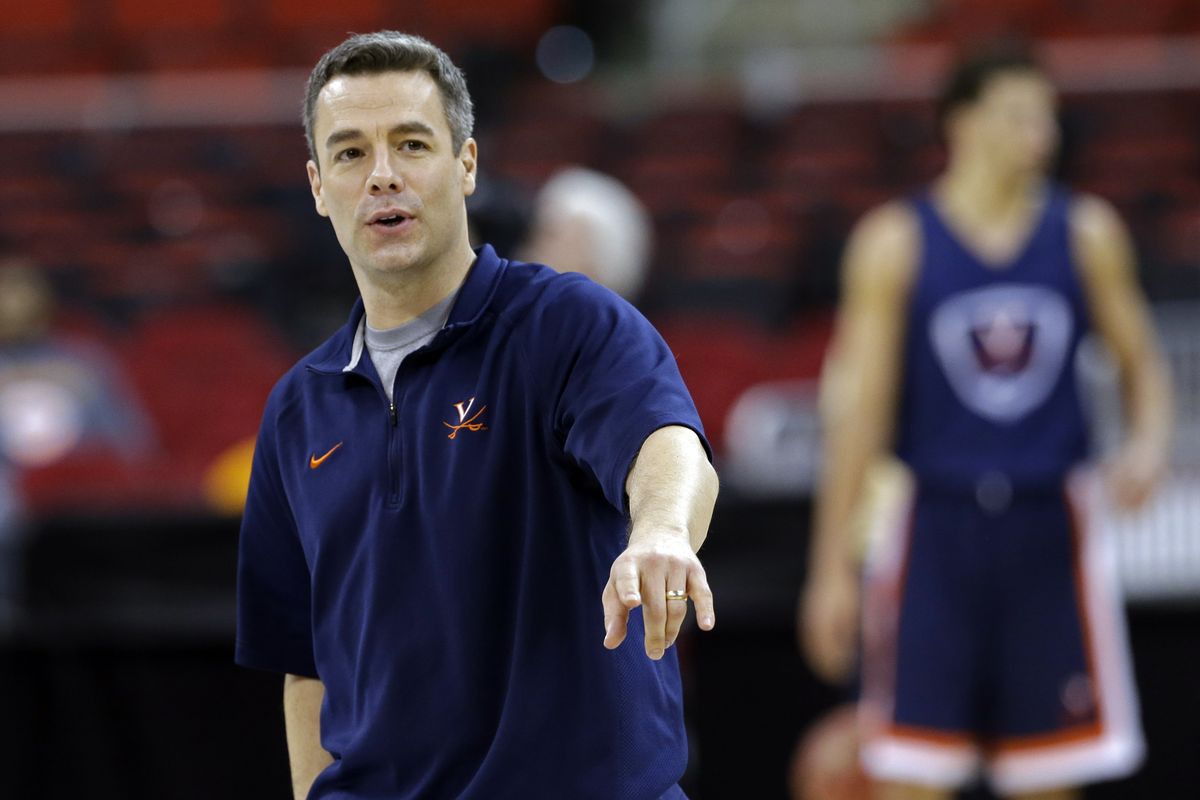Michigan State’s Izzo and Virginia’s Bennett have long history

EAST LANSING, Mich. – The first taste of USA Basketball, the first NCAA tournament game, the first Final Four – these are big moments in a basketball career, and Tony Bennett has shared them with Michigan State.
His biggest as a coach could come at the Spartans’ expense, tonight at New York’s Madison Square Garden, when his No. 1 seed Virginia Cavaliers (30-6) take on No. 4 seed MSU (28-8) in the East Regional semifinals. He’s up against Tom Izzo, whose coaching career was but an aspiration when he worked basketball camps in Wisconsin run by Bennett’s father, Dick, and uncle Jack in the late 1970s.
They call Green Bay home and Izzo is from Iron Mountain, 100 miles away.
“This is as home as it gets for me,” Izzo said, “as far as knowing who I’m playing.”
In a tournament run that has already brought Izzo together with a mentor (Jud Heathcote) and an old friend (Harvard coach Tommy Amaker), Friday brings him face to face with the son of a respected adversary and the root of his basketball beliefs – that it all starts with stopping people.
“With Dick I never complained about a foul until the guy’s legs came off the floor as he was holding onto our guys as they were running through,” Izzo joked of the elder Bennett, who took over at Wisconsin in 1995, Izzo’s first season as MSU’s head coach, and left early in the 2000-01 season. “His teams were so good that way, and they were so disciplined. I mean, I think it’s a different era. I think (Tony has) just taken a lot of the same principles. They’re solid. They don’t take chances. They’re physical from what you can do nowadays. They help each other. They move together. You can call it pack, you can call it whatever you want.”
The official term is “pack-line” defense, developed by Dick Bennett and designed to deny penetration, with four players creating an amoeba of sorts a few feet inside the three-point line while the fifth pressures the ball. This Virginia team excels at it thanks to communication and length, and it is not unlike the man defense Izzo employs.
The difference in philosophy is that Izzo and Heathcote look at defense as a way to create transition offense, and the Bennetts look at it as a way to kill the transition offense of others. When they’ve met in the past, the preferred Bennett pace usually wins out – it’s easier to force slow than force fast unless you’re willing to press and give up layups, and Izzo isn’t – and that’s a safe expectation for today.
It was certainly the case on April 1, 2000, when MSU and Wisconsin met for the fourth time that season, in the Final Four. Tony Bennett was a volunteer assistant for his father after three seasons in the NBA and four overseas. He got to experience a thrill of coaching right away, even if the game wasn’t credited for thrilling many others.
“Just a war,” the 44-year-old Tony Bennett said of a game MSU led 19-17 at the half and won 53-41. “It was great to play in the Final Four, that was there, but it was hard to come by buckets in that game. I can remember a lot of people thought it wasn’t the prettiest game and maybe there’s some truth to that. But it was just so hard to get looks.”
An MSU team Bennett called “one of the finest I’ve seen” got enough to advance, then defeated Florida 89-76 in an up-and-down game two days later to win it all.
“You know,” Izzo said Tuesday, “until the day I die of all the accomplishments I think we’ve had, beating Wisconsin that year four times will probably always rank as one of the top.”
The average score of those games was MSU 57, Wisconsin 47. Dick Bennett and Izzo met a total of 13 times in the Big Ten, with MSU winning 10 and with an average score of MSU 57, Wisconsin 51.
After three professional seasons with the Charlotte Hornets, Tony Bennett kept playing in Australia, then New Zealand. He was not sure he wanted to get into coaching – the combination of reward and pressure he saw from his father’s career served as a “yellow light,” he said – but he gave it a shot as player-coach in his final pro season in Auckland, New Zealand.
Bennett recalled watching Izzo’s first Final Four team on TV and taking note of some its offensive sets.
“ ‘Oh man, that’s good,’ ” he said of his reaction at the time. “(I took) some ideas to help our pro team there. So that should tell you what I think of him.”
Dick Bennett was burned out three games into the 2000-01 season and decided to retire. Tony Bennett stayed on as a full-time assistant for interim coach Brad Soderberg, then worked for two seasons under Bo Ryan and further developed his own offensive philosophy.
Dick Bennett came out of retirement in 2003 to take over at Washington State – Heathcote’s alma mater – and his son joined him and took over in 2006 after Dick retired for good. Two NCAA bids and a Sweet 16 followed, then the move to Virginia. At every stop, in every season, their teams played defense.
And now 70-year-old Dick Bennett gets to see the extension of a legacy and, today, the renewal of a rivalry – though he has said he has trouble even watching his son’s team play, let alone attend games. He declined an interview request through the University of Virginia.“I feel bad because he should enjoy this,” Izzo said. “Because his son is a protege of him, and he did it the right way.”